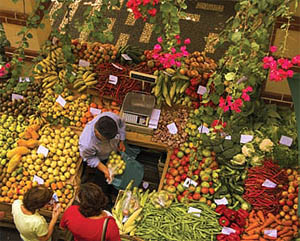Promoting local agriculture
In North Carolina, productive land is being lost to development while more people are seeking locally grown foods. Triangle Land Conservancy, a community land trust, is encouraging the use of its lands for food production by offering long-term leases to new farmers.
The current paradigm for agricultural production focuses on farms that produce food on a large national and international scale, not on small, local farms. Over the last few decades, in my home state of North Carolina, local farms have lost their competitive edge and due to declining profitability are being supplanted by development. Urban communities near Raleigh, for example, lose working lands to development at the rate of 40 acres per day.
At the same time, there are changes in urban, suburban, and rural communities that are leading to more demand for locally produced foods and creating an opportunity to take a new look at local agriculture. People are increasingly concerned with the quality of food and in knowing how the food is produced. Moreover, transportation costs to move agricultural products from production to market are rising, while farmers markets, community supported agricultural cooperatives, and local and organic foods being sold in traditional grocery stores are in demand.
As part of its working lands protection program, Triangle Land Conservancy (TLC) has embarked on a new agenda to promote local small farm agriculture. What makes TLC’s “Small Farms-Local Food” initiative distinct is that a nonperpet profit land trust seeks to play an active role in supporting local agriculture by encouraging the production of agricultural products on its land— influencing the use of local markets and creative leasing arrangements with emerging farmers.
TLC is a community land trust whose region, known as the “Triangle,” is home to the Research Triangle Park in and around Raleigh, Durham, and Chapel Hill, North Carolina. Like nearly 2,000 other land trusts in the country, TLC works with local community members to conserve natural resources and working lands. What sets TLC apart is not what it has done in the last 25 years, but what it will undertake in the future with Small Farms- Local Food.
In the Triangle, with a growing population of 1.5 million, the conservancy has accumulated 250 acres of valuable conservation acreage. A portion of that acreage, which is currently fallow farmland, has inherent value if placed back in production. TLC proposes to utilize its land assets through longterm leasing arrangements (30–50 years) with local food producers. These lease arrangements will provide a marketable security to farmers, enabling them access to lending institutions to borrow for capital improvements. In return, TLC will get lease payments and the farmer will have complete and long-term control of the land, similar to ownership. The lease payments will offset the cost of running the program, and with enough volume would generate cash-flow for TLC to consider leveraging the purchase of additional farmlands.
The best way to keep agricultural land in production, TLC believes, is to keep small farms profitable. Putting fallow lands back into agricultural production contributes to local economic development and the productivity of small farm agriculture can provide community benefits such as higher farmer revenues and tax revenues, generated from the larger per-acre income yields.
This initiative is designed to fill voids that currently inhibit entry into the market by new farmers because of high land acquisition costs. Land leasing is common in the agricultural field, however, contemporary land leases generally have a short duration, which is not conducive for farmers and banks to invest in capital improvement.
At the end of the day, with the Small Farms- Local Foods initiative, TLC hopes to stimulate a series of small farms into production in the Triangle, prompting a new look at the character of local agriculture.




